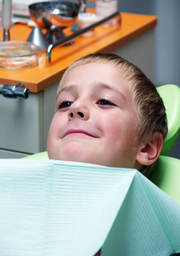Advice for Parents: Dealing with Kids’ Dental Fears
Dental anxiety in children is a common concern that can have a lasting impact on their oral health. Every child is unique with their own level of apprehension and nervousness. For some it can become a major issue. As parents, it’s essential to address these fears early on to ensure a positive dental experience for your kids.
One effective strategy is to seek the assistance of a dentist sensitive to the concerns of kids. Additionally, there steps you can take to prepare your child and deal with problems that arise. Here is practical advice on how to navigate and alleviate kids’ dental fears.
Importance of addressing kids’ dental fears
Dealing with dental fears in children is crucial for their overall well-being. Unaddressed fears may lead to avoidance of dental care, resulting in long-term oral health issues.
Common reasons for dental anxiety in children
Understanding the root causes of dental anxiety is the first step in addressing the issue. Common reasons include fear of the unknown, previous negative experiences, or simply the intimidating dental environment.
Understanding Dental Anxiety
Recognizing signs of dental fear
Parents should be vigilant in recognizing signs of dental fear, such as reluctance to attend appointments, visible signs of stress, or changes in behavior leading up to a dental visit.
Impact on oral health
Dental anxiety can contribute to poor oral health habits. Children with dental fears may neglect regular brushing and flossing, leading to cavities and other dental issues.
Creating a Positive Environment
Choosing a child-friendly dental clinic
Selecting a dental clinic with a child-friendly atmosphere can significantly reduce anxiety. Look for clinics with colorful decor, friendly staff, and waiting areas equipped with toys and books. Having these simple additions in a dental clinic can bring a lot of comfort to children who are nervous about the visit.
Introducing kids to the dental setting
Familiarize your child with the dental setting before their first appointment. Visit the clinic together, allowing them to explore the environment and ask questions.
Open Discussions
Talking to children about dental visits
Open and honest communication is key. Explain the importance of dental visits in simple terms, emphasizing the positive aspects of maintaining healthy teeth.
Addressing their concerns and fears
Encourage your child to express their fears and concerns. Addressing these anxieties head-on can help build trust and alleviate apprehension. In some cases, pediatric sedation may be necessary and a possible when a child cannot manage extreme anxiety or is uncooperative.
Positive Reinforcement
Encouraging good oral hygiene habits
Promote positive oral hygiene habits at home. Celebrate achievements such as brushing without resistance or completing a dental check-up successfully.
Celebrating successful dental visits
Reward your child for successful dental visits with a small treat or a fun activity. Positive reinforcement creates positive associations with dental care.
Distraction Techniques
Incorporating fun distractions during visits
During dental appointments, use distraction techniques such as bringing their favorite toy or discussing exciting topics to divert their attention.
Using technology to ease anxiety
Allow your child to use headphones and listen to music or watch videos during the dental procedure to reduce anxiety.
Professional Guidance
Consulting pediatric dentists
Pediatric dentists specialize in children’s dental care and employ strategies to make the experience enjoyable. Seek their guidance for effective approaches.
Seeking psychological support if needed
In cases of severe dental anxiety, consider seeking psychological support for your child. Therapists can help children manage and overcome their fears.
Gradual Exposure
Slow introduction to dental tools
Gradually introduce your child to dental tools at home before their appointment. This can demystify the instruments and reduce fear.
Building trust over multiple visits
Consistency is key. Regular dental check-ups can help build trust between your child and the dental professionals, making future visits less daunting.

Leading by Example
Displaying positive attitudes towards dental care
Demonstrate a positive attitude towards your dental care routine. Children often model behavior, so showcasing a relaxed approach can positively influence them.
Avoiding negative language
Avoid using negative language when discussing dental visits. Choose words that convey a sense of routine and normalcy.
Overcoming Traumatic Experiences
Addressing past negative dental encounters
If your child has had a negative dental experience, address it openly. Discuss what went wrong and reassure them that steps have been taken to prevent a recurrence.
Rebuilding trust in dental professionals
Work closely with dental professionals to rebuild trust. Allow your child to ask questions and involve them in decision-making when appropriate.
Related Reading: Learn how to choose the best pediatrician for your child.
The Role of Pediatric Dentists
Specialized approaches to alleviate fears
Pediatric dentists are trained to use specialized approaches to ease children’s fears. Trust their expertise in making dental visits a positive experience.
Importance of early dental check-ups
Early and regular dental check-ups can prevent the development of dental fears. Starting dental visits early helps children become accustomed to the routine.
Online Resources and Apps
Utilizing educational resources
Explore online resources that provide child-friendly information about dental care. Educational videos and games can make learning about oral health enjoyable.
Interactive apps for dental education
Engage your child in interactive apps designed to educate them about dental care. Fun and educational apps can dispel myths and create a positive attitude towards oral health.
Creating a Dental Routine
Establishing regular dental check-ups
Make dental check-ups a regular part of your child’s routine. Consistency reinforces the idea that dental visits are a normal and necessary aspect of healthcare.
Making oral care a daily habit
Encourage daily oral care habits at home. Brushing and flossing become second nature when integrated into the daily routine.
Dealing with Special Needs
Tailoring approaches for children with special needs
Children with special needs may require personalized approaches. Collaborate with healthcare professionals to tailor dental care strategies that suit their unique needs.
Collaborating with healthcare professionals
Work closely with healthcare professionals to develop a comprehensive plan that addresses both dental and overall health needs.
Dealing with kids’ dental fears requires a multi-faceted approach. Choosing a child-friendly environment, fostering open communication, and seeking professional guidance are crucial steps.
Parents play a pivotal role in creating positive dental experiences for their children. Empowering parents with knowledge and strategies can make the journey smoother.
At what age should I start taking my child to the dentist?
It is recommended to schedule your child’s first dental visit by their first birthday or as soon as their first tooth erupts.
How can I encourage my child to brush their teeth regularly?
A: Make brushing fun by using colorful toothbrushes and flavored toothpaste. Brush together as a family to set a positive example.
What role do genetics play in children’s dental health?
Genetics can influence the susceptibility to dental issues, but maintaining good oral hygiene practices is crucial regardless of genetic factors.
Are there natural remedies to ease dental anxiety in children?
Some parents find success with calming activities like deep breathing exercises, music, or using essential oils to create a soothing atmosphere.
How do I handle a dental emergency with my child?
In case of a dental emergency, contact your dentist immediately. If there is severe pain or injury, seek emergency medical attention.





